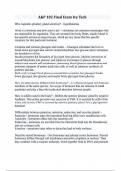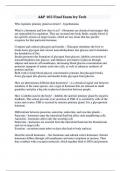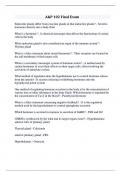A&P 102
Ivy Tech
All 3 results
Sort by

-
A&P 102 Final Exam Ivy Tech
- Exam (elaborations) • 24 pages • 2024
-
- $13.00
- + learn more
Who regulates pituitary gland secretion? - hypothalamus What is a hormone and how does it act? - Hormones are chemical messengers that are responsible for regulation. They are secreted into body fluids, mainly blood. It has specific actions on target tissues, which are any tissue that has specific receptors for that particular hormone. Compare and contrast glucagon and insulin. - Glucagon stimulates the liver to break down glycogen and convert noncarbohydrates into glucose and it stimulate...

-
A&P 102 Final Exam Ivy Tech
- Exam (elaborations) • 24 pages • 2023
-
Available in package deal
-
- $13.00
- + learn more
Who regulates pituitary gland secretion? - hypothalamus What is a hormone and how does it act? - Hormones are chemical messengers that are responsible for regulation. They are secreted into body fluids, mainly blood. It has specific actions on target tissues, which are any tissue that has specific receptors for that particular hormone. Compare and contrast glucagon and insulin. - Glucagon stimulates the liver to break down glycogen and convert noncarbohydrates into glucose and it stimulate...

-
A&P 102 Final Exam
- Exam (elaborations) • 18 pages • 2023
-
Available in package deal
-
- $13.00
- + learn more
Endocrine glands differ from exocrine glands in that endocrine glands? - Secretes hormones directly into a body fluid What is a hormone? - A chemical messenger that affects the functioning of certain cells in the body What endocrine gland is also considered an organ of the immune system? - Thymus gland What is a false statement about steroid hormones? - Their receptors are located on the cell membrane of their target cells What is a secondary messenger system of hormone action? - A m...

How did he do that? By selling his study resources on Stuvia. Try it yourself! Discover all about earning on Stuvia


